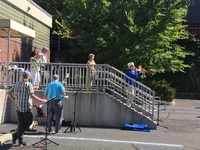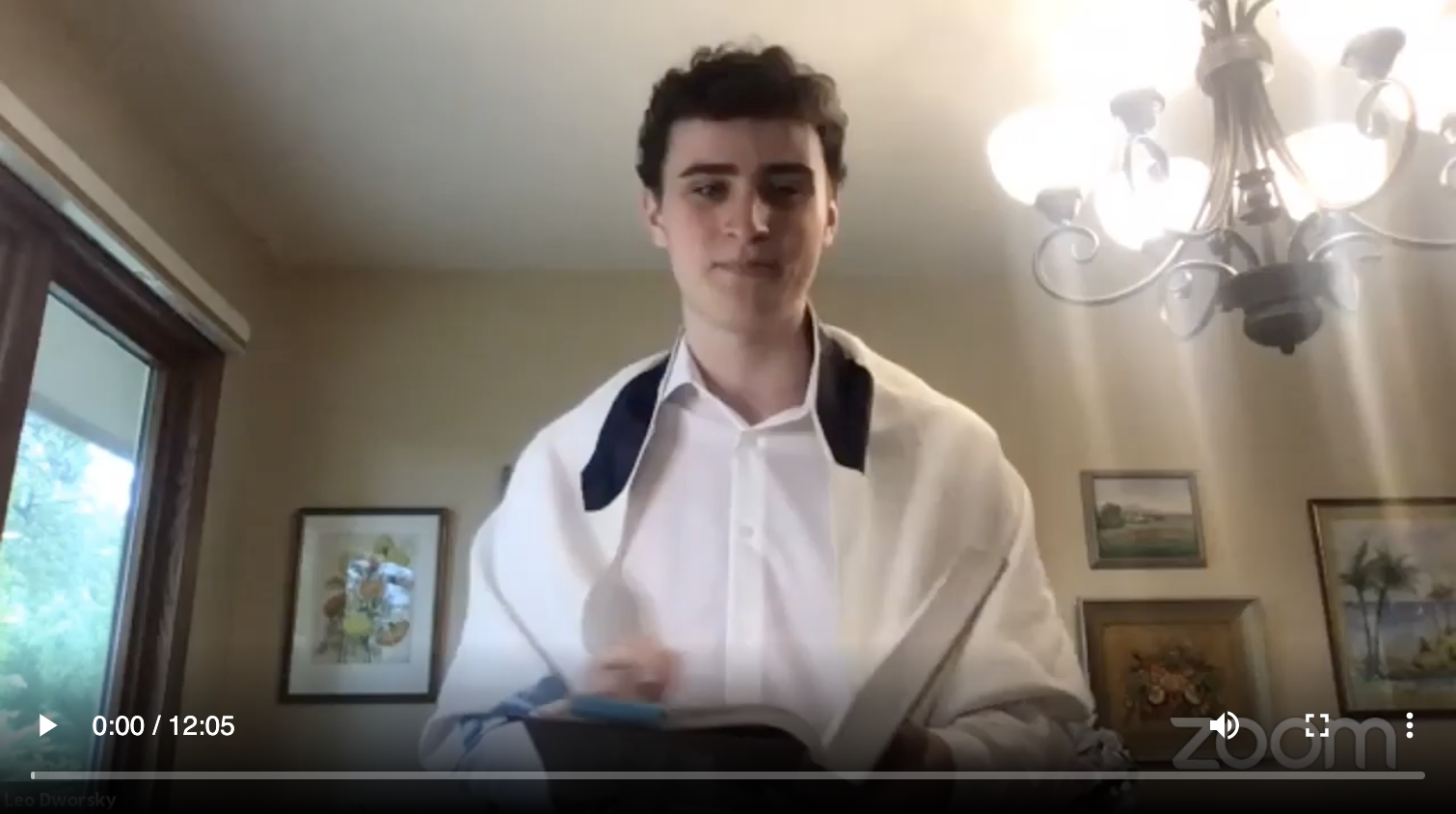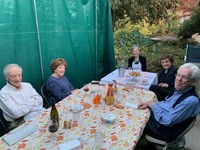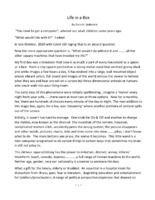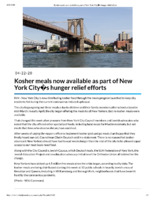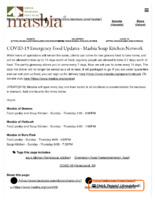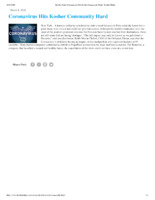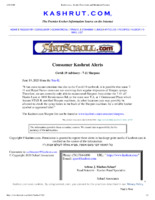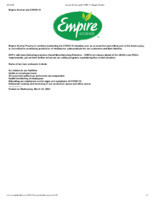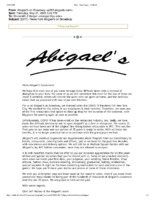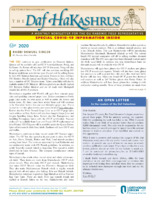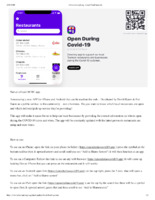Items
The items below are from collecting projects that have partnered with RRCHNM or given permission to index their collections. You can see even more items that have been collected during the pandemic by browsing the websites of specific collecting projects.
-
High Holidays 2020 at Congregation Beth Hatikvah, Summit, NJ
Two photos of the Sanctuary-turned-into-a TV Production Studio Two photos of our Shofar service in our parking lot (our only in-person experience) One photo of the Zoom experience of the Torah Service. The Torah Reader used a virtual laser pointer so the congregation could follow along as he was reading. One video of our teens playing Oseh Shalom with string instruments with our volunteer Singers joining in later in the number. One Word document with the description of our High Holiday planning. -
Sermon from Rabbi Olitzky - Ivri: Traditional Service - Rosh Hashanah Day 1
Rosh Hashanah Virtual Sermon -
Conservative Judaism in Northampton
Noah Barondes interrupted his October bar mitzvah ceremony to ask, to no one in particular, “Where are they going?” This ‘they’ would be the twenty some masked and socially distanced bar mitzvah attendees, caught in the act of an awkward, would-be surreptitious shuffle to the sunlight from the cold shaded tent they were originally sitting in. This disturbance in the ceremony, although relatively humorous, is just one of the many disruptions of Northampton’s Congregation B’nai Israel’s services induced by the pandemic. Unable to meet in person due to the risk of COVID-19 transmission, the synagogue has been forced to move its services online for streaming. This proved an immediate issue, as Conservative Jews practice Shabbat by not using electronic media (including taking pictures or being photographed, as streaming requires). This creates a whole host of restrictions most other religious groups did not have to consider when transitioning to an online service format. In addition to this, services at Congregation at B’nai Israel feature a strong focus on cooperative, communal prayer, and leading that prayer over the Internet is much more difficult than in-person. Normally, attendees would sing all together, creating lots of energy, but being on Zoom or a live-streamed service makes that kind of connection impossible. Services can feel inauthentic as religious experiences and more like chores, since many people are doing their jobs over Zoom, sitting in the same place in their home and at the same computer they work from. And that’s not even to mention the ways Zoom shortens people’s attention spans, making it far more difficult to sit down and concentrate on prayer. To adapt to these challenges created by the pandemic, Congregation B’nai Israel and its leaders have looked to the larger Jewish community and authority to guide their decisions on how to continue practicing their religion and reaching all members of their community at a time when they cannot be together. While it was unconventional and potentially against Jewish law to move services online, the United Synagogue of Conservative Judaism, the larger organization the Congregation is part of, was able to find solid rationale for bending those restrictions in order to keep people connected to their Jewish communities. For their part, Congregation B’nai Israel has made some adjustments to their services in order to make them more Zoom-friendly. For one thing, they have made services shorter, in order to combat that reduced attention span of service attendees. Their Shabbat morning services have shifted to become more focused on conversation and study of different texts, with a few prayers in the beginning and end of the service. The attendees seem to really enjoy this, but it’s unclear whether the new format will continue once the pandemic is over. Congregation B’nai Israel also monitors and responds to the pandemic with their personal COVID-19 task force, which includes a few infectious disease experts as well as the synagogue president. They work together to come up with recommendations on what will be safe for the community to do as far as in-person gathering, and whatever they say is carried out. At the moment, they have considered it safe to provide a few, heavily limited opportunities for in-person worship, one of which was Noah Barondes’s bar mitzvah. These gatherings are restricted to a specific size, and social distancing measures and masks are enforced at all times. In addition to these structural adaptations to the pandemic, Rabbi Justin David adapted the contents of his service too. He infused Barondes’s bar mitzvah with themes of hope and resilience, referencing the various tragedies of humanity in the Hebrew Bible and reminding the congregants that nevertheless, humanity persevered. This communal acknowledgement of suffering combined with the assurance that the community will survive is a reminder that religion is more than its rituals and practice: it’s a source of collective, spiritual strength in times of adversity. In a way, CBI’s services themselves act as a natural adaptation to the pandemic by providing a response to coronavirus anxieties. -
Thanksgiving in the Sukkah
This photo was taken on Thanksgiving day 2020. Due to the mild weather in Atlanta, local members of the Jewish community rebuilt their sukkah in order to safely have Thanksgiving outside. -
Essay, "Life in a Box" by Doris H. Goldstein
Essay written by Doris H. Goldstein of Atlanta, Georgia. A copy is housed in her papers in the Ida Pearle and Joseph Cuba Archives for Southern Jewish History at the William Breman Jewish Heritage Museum in Atlanta, Georgia (Mss 275, Martin and Doris Goldstein Papers, Box 1, File 5) -
Weekly Messages from Rabbi Bruce Aft
These blog posts from Rabbi Bruce Aft detail his response to the COVID-19 pandemic prior to his retirement in the summer of 2020. -
Prizmah Knowledge Center Resources on Finances Amidst the COVID-19 Pandemic
Prizmah is the network for Jewish day schools across North America. This is a collection of Prizmah's Knowledge Center resources that address general finances, financial aid, and budgeting during the COVID-19 pandemic. -
Prizmah Knowledge Center Resources on Mental Health & Emotional Support
Prizmah is the network for Jewish day schools across North America. This is a collection of Prizmah's Knowledge Center resources that address mental health and emotional support for families and their children. -
Prizmah Blog Posts on Mental Health & Emotional Support
Prizmah is the network for Jewish day schools across North America. This is a collection of blog posts that talk about mental health and emotional support. -
Prizmah Blog Posts on Celebrating Holidays during Covid-19
Prizmah is the network for Jewish day schools across North America. This is a collection of blog posts that talk about celebrating the holidays amidst the COVID-19 pandemic. -
Prizmah Knowledge Center Resources to Celebrate Holidays during Covid-19
Prizmah is the network for Jewish day schools across North America. This is a collection of Prizmah's Knowledge Center resources that help families celebrate holidays amidst the COVID-19 pandemic. -
New York City Free Meals
This collection documents the distribution of free kosher meals throughout NYC in light of the COVID-19 pandemic -
Mocha Bleu
Mocha Bleu is a kosher restaurant in Teaneck, NJ, that offered delivery and online ordering to customers as a result of the COVID-19 pandemic. They offered free masks to the community and donated a majority of their masks to two local hospitals. -
Masbia
Masbia is a food pantry and soup kitchen in New York. These e-newsletters address how Masbia has responded to the needs of its community during COVID-19 -
Lakewood Box
These items showcase different prepared boxes that cover the meals needed for the Passover and other Jewish holidays, taking the stress off the shoulders of those observing Passover on their own for the first time because of COVID-19 restrictions. -
Kosher Wine
These items focus on how to order Kosher wine online and offer virtual experiences, such as virtual wine tastings. -
Kosher Today
Posts from a kosher food industry newsletter reporting on the impacts of COVID-19 on the industry -
Kosher Marketplace
These items cover how Kosher Marketplace, "New York City's Finest Kosher Food Emporium," adjusted their hours for the Passover Holiday and adapted their practices to the fit the COVID-19 pandemic. -
KOSHER19
KOSHER19 was started by Bethany Mandel to put kosher foods into the hands of healthcare workers (regardless of religion) who are working on the frontlines of the COVID-19 pandemic. -
Kashrut.com
Kashrut.com is a website that provides information about kosher products. These two web captures discuss face masks and 7-11 slurpee syrups. -
Empire Kosher
These items relating to Empire Chicken address their health and safety protocols, a temporary closure due to COVID-19, and a donation to a Kosher food bank. -
Abigael's on Broadway
In this email and related article discuss how Abigael's, a kosher restaurant, was forced closed as a dine-in restaurant because of COVID-19. -
Kosher Food Industry Affected By COVID-19
These items show how Jewish restaurants and the Kosher food industry have been negatively impacted by COVID-19, such as closures -
Kosher Restaurants and Passover
These items address how kosher restaurants have adapted to COVID-19 in order to serve their communities for Passover. -
Restaurants Reopening and Adapting to COVID-19
These items show how kosher restaurants have adapted to COVID-19, such as offering online ordering, curbside pickup, delivery, and outdoor eating.
